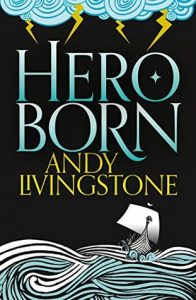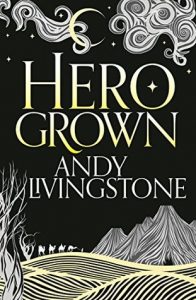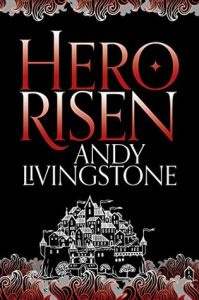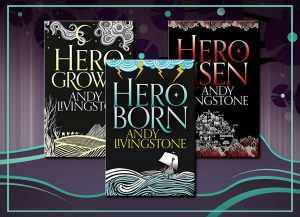Author Spotlight – Andy Livingstone
Joining us for today’s Author Spotlight is Andy Livingstone!
Andy Livingstone started life as a baby and was first taught to read, as a toddler, by his ex-primary-school-teacher mum, opening up a host of new worlds to his delighted imagination, leading first to childhood years filled with reading and later to the publication of four short children’s books when he was in his early twenties. Fast-forward to the age of 51 and he is now a former trainee surveyor (short-lived), former journalist (for 20 years) and current local authority PR officer of 10 years’ standing. He has one son who is a professional footballer with the club Andy has supported from birth, another son who is more intelligent and funny than he is, a wife who is more intelligent, funny and good-looking than he is, four grown-up step-children who have taught him more about life than they realise and parents (actual and in-laws) who have taught him even more about, well, everything really, so he feels he has profited pretty well from these relationships.
More relevantly to this interview, he was one of 15 new writers signed by HarperVoyager’s UK office for their Digital First programme after a worldwide call for unagented SFF authors had attracted more than 5000 manuscripts. The result was the Seeds of Destiny trilogy, comprising Hero Born, Hero Grown and Hero Risen, each of which is available from all good online booksellers and which are (cough, nudge) particularly good value for money as ebooks. He is currently working on Blood of Antiquity, the first book of a new series.
Welcome to the Hive, Andy. Let’s start small: tell us about a great book you’ve read recently!
I don’t read a great deal when I’m writing, partly because I don’t want to be influenced by someone else’s style and mainly because I have a day job and a family and my writing time is therefore very limited, so I need to use what would be reading time as writing time. However, I can’t not read altogether, so have a quick 15 minutes or so in bed at night before I drop off. It takes me ages to finish reading a book as a consequence, but I have managed in the last week to complete The Emperor’s Blades, by Brian Staveley. I am always on the lookout for new authors to try and Brian was recommended by a 6’6” ex-nightclub bouncer who was painting our living room. He was hugely enthusiastic about this author (and hugely more than a foot bigger than me) and so I felt I dare not fail to try this book – and I’m glad I gave it a go!
Okay, time to escalate things: reality warps and you suddenly find yourself leading a D&D-style party through a monster-infested dungeon. What character class are you, and what’s your weapon of choice?
Right, I have to be honest here – I played D&D last as a teenager, more than 30 years ago. What you also have to bear in mind was that only one of our group had ever read the rules, so he taught us his version of how it was played. (Funnily enough, he always was the only one who survived each time.) And we played in the back of a car on the way to and from school. So you’ll be getting the picture, then, that it wasn’t just a long time ago, but it also wasn’t even real D&D.
All this is really just me getting my excuses in now in case what I’m about to say is embarrassingly nonsensical to proper D&D experts, but here goes: I always liked elves (the Tolkien type, not the Enid Blyton type), and I liked the mystery and expertise of thieves, but Aragorn was always my favourite character growing up, so if it’s allowed, can I be a half-elf/half-human warrior-thief, please?
Oh, and a sword. Always a sword.

When you’re not Striding through dungeons, how do you like to work? (In silence, with music, or serenaded by the damned souls of a thousand dead shrimps? Do you prefer to type or to hand-write? Are you an architect or a gardener? A plotter or a pantser? D’you write in your underwear, or in a deep-sea diver’s suit?) Tell us a little bit about your writing method!
As I have the aforementioned day job and busy family life, I have to try to write wherever I can and whenever I get the chance, so I just have to take the conditions afforded me. Luckily, having spent the first 20 years of my working life as a newspaper reporter, I am well used to writing regardless of what is going on around me! If I get the chance to control the situation, though, my preference is with music – I have an ever-expanding playlist for writing and use either that or whatever album takes my fancy (currently anything by The White Buffalo)… although if I really get into the zone I can suddenly realise that four or five songs had gone past without me noticing them.
When I wrote Hero Born, I was very much a gardener – I started it to see if I was capable of writing a novel, and just wrote what I would like to read and waited to see where the story would take me. I had a rough idea of the plot, with certain things I knew would happen along the way like overnight stops on a long journey, but the path from one stop to another materialised as I wrote. What I did find, however, was that I got to book length and was only part-way through the overall journey I had envisaged, which is why it became a trilogy. Hero Born took ten years to find a publisher, however, and every time it was rejected by an agent or publisher in that period I changed something, large or small, before I sent it off again in the hope that, in doing so, I had improved it – so the ‘garden’ grew even then!
When I moved on to Hero Grown, this time knowing it was part of a trilogy, I had to plan a bit more to allow the overall story arc to be proportioned properly over the three books – plus it had to fit with what had gone on before. The result was that it was a sort of gardening-architectural hybrid. Hero Risen then needed to bring it all together so it was, against my natural writing instincts, much more planned, although the plan changed a million times as the writing progressed.
Hero Born was written about 17 or so years ago, before I owned a laptop, and was written in breaks at work or in my car as I waited for my step-daughter to come out from her dancing lessons, or myriad other snatched moments, so it was hand-written in a series of A4 notebooks. I then enlisted the help of a lovely lady called Margaret, who was a copy-typist at the newspaper I worked for at the time, to type it up from Dictaphone tapes I recorded (there was no chance she or anyone else would have been able to read my scrawl) and I transferred the digital version she created onto the big old creaky PC that sat in the corner of our dining room at home. By the time I got the contract with HarperVoyager for the trilogy, and therefore had to start writing the second book in the series (I had always vowed not to start it until Hero Born had been accepted by someone so I would have nothing distracting me from dedicating myself to finding a publisher for it), technology had moved on, and I wrote Hero Grown, and all since, on a laptop.
What (or who) are your most significant fantasy influences? Are there any creators whom you dream of working with someday?
I read The Hobbit when I was six and subsequently the Lord of the Rings, opening me up to a genre I had never known existed. There is a scene in the Lord of the Rings where the Riders of Rohan encounter the party and thunder up to them, circling them in a whirl of chainmail, lances and hooves – to my young mind, it was the most thrilling image I had ever read. I also adore the humour in the Fritz Leiber books and grew up loving the way that Raymond E Feist makes his characters likable, and if I can achieve any small part of those three things in my writing, I will be a happy, and lucky, man.
What was the last thing you watched on TV and why did you choose to watch it? Alternatively, what games have you enjoyed recently?
Well, Game of Thrones, obviously. But, apart from that, my wife and I love to binge a crime drama, so we’ve worked through six series of Silent Witness, a series each of Antipodean dramas Secret City and The Bad Seed and are currently getting battered into Riviera. We are also partial to Billions and Suits, but having to watch them the old-fashioned way (weekly) is proving ridiculous and frustrating. DO THEY NOT KNOW WE ARE THE GENERATION WITHOUT PATIENCE? Oh, and The Punisher. I love The Punisher.
 The world shifts, and you find yourself with an extra day on your hands during which you’re not allowed to write. How do you choose to spend the day?
The world shifts, and you find yourself with an extra day on your hands during which you’re not allowed to write. How do you choose to spend the day?
Easy. Reading, watching my older son play football, talking to my younger son about football stats and going out for dinner with my wife. Sorted.
And then feeling guilty at not having written.
Can you tell us a little something about your current work(s) in progress?
The Seeds of Destiny trilogy is intended to be the first part of a trilogy of trilogies following the story of Brann and his companions, and the first book in the second trilogy has now been written. This, however, may have to wait for publication until sales are higher for the first three books – they have been bought by a pleasing number of people in the eyes of a new author unused to people paying for his words, but not in the eyes of publishers’ accountants – so if some more people want to hand over their hard-earned money for them, then we could crack on with that series (cough, hint, cough).
In the meantime, I have started on a new book in a completely different world. Set in a sprawling and teeming post-apocalyptic city and its surrounds, with technology roughly early to mid Twentieth Century, and seen from five character viewpoints rather than just the one, this is a new writing experience for me after about 600,000 words looking through Brann’s eyes at a mediaeval-type world, but it’s one I’m really enjoying. I’m about 25,000 words into it and starting to pick up speed.
What’s the most (and/or least) helpful piece of writing advice you’ve ever received?
The first pieces of writing advice were from my Primary 1 teacher, Mrs Richmond, who told me to close my eyes, imagine a picture in my head and then write down what I see and feel, and from my Dad, who a couple of years later told me to think what I wold expect to happen in a story, and then do something different, because life’s like that. I still use both of those.
The other useful advice was from myself. After taking about a month to write the first page of my first book and still not having it perfect, I told myself, “just ****ing get the story down, and then come back and see what parts you’d like to say better.” It’s amazing when you get into a groove how often you fly through a thousand words without thinking and later realise that this is one of the bits you are quite pleased with. It’s the writing you agonise over that ends up most awkward and stilted.
Every writer encounters stumbling blocks, be it a difficult chapter, challenging subject matter or just starting a new project. How do you motivate yourself on days when you don’t want to write?
I’m kind of lucky that way – I have worked as a journalist and in PR for more than thirty years, where you are never allowed to have a day where it’s difficult to write. It’s a job, so you learn just to sit down and do it. That doesn’t mean it can’t be a chore and a slog sometimes, but if you push through those parts then it gets easier again.
It also helps, of course, to have an overactive imagination. Well, it helps at writing times; not so much while I’m driving/having a conversation/piloting a light aircraft*/etc.
*The aircraft one may be made up.

If you could visit any country at any point in history, where/when would you go, and why?
Oh, somewhere warm and dry for a start – I’m Scottish, so anywhere warm and dry is a bonus. Alexandria round about 260BC would be nice, with the lighthouse shining forth, the library in full thriving mode and in the midst of its literary golden period, great minds sharing their thoughts and the first Ptolemy (who was a general to one of my heroes, Alexander the Great) still in living memory. Yep, I wouldn’t mind a wee visit there – what an atmosphere to be a part of and what people you might bump into.
Tell us about a book that’s excellent, but underappreciated or obscure.
I’m maybe not the best to ask this, because while I love fantasy, I tend to just like what I like and am not well up on what is popular or talked about with high praise. I am aware of the greats – past and present – of course, but I may think someone is underappreciated or obscure and then find that I look like an idiot (albeit looking like an idiot is one of my greatest talents, right enough) because it turns out that everyone already knows how good this book/author is.
Having said that, for the sake of this question I’ll put my dignity on the line and point out that the Fritz Leiber books, following the adventures of Fafhrd and the Gray Mouser, are a delight. Many Fantasy fans will be scoffing at me as mentioning these as underappreciated or obscure, but these books may have slipped past the notice of younger or newer readers and, if so, I’d heartily recommend they are given a go.
Finally, would you be so kind as to dazzle us with an elevator pitch? Why should readers check out your work?
Someone in a publishing house once told me that my books “capture a classic sense of adventure in a way that’s rare” and that is one of the comments on my work that make me most proud (and relieved!) because that was what I always set out (and hope) to do, first and foremost. I grew up loving adventure stories, mostly in books but also in films, and that is where my imagination goes. Readers also tell me they care about my characters, which pleases me, too (obviously!) and the world they inhabit (which is born from the combination of a love of ancient history and a horrendous memory that results in me making up a version based on a few facts and a lot of impression) seems to have felt as real and enticing to others as it has to me. So, basically, if you like a character-driven adventure story told through historical fiction about a world similar to our own, then give it a go and then, when it continues in future books, you will be able to feel part of the reason that it did so. And, at £1.99 for Hero Born as an ebook, each penny gets you a whopping 170-odd words, which is value for money that you seldom see these days. And you will like Brann and his mates. How can you resist, people, how can you resist???
How indeed? Thanks for joining us, Andy, and good luck with the new novel!
Andy Livingstone is the author of the Seeds of Destiny trilogy, published by Harper Voyager and available now.


Have read all three books and thoroughly enjoyed them. And yes the characters (the main ones) were extremely likeable.